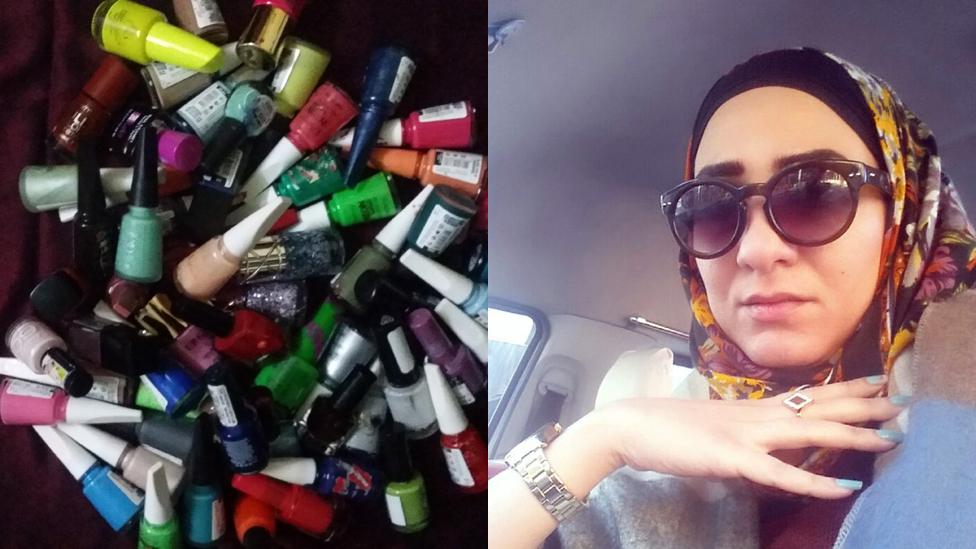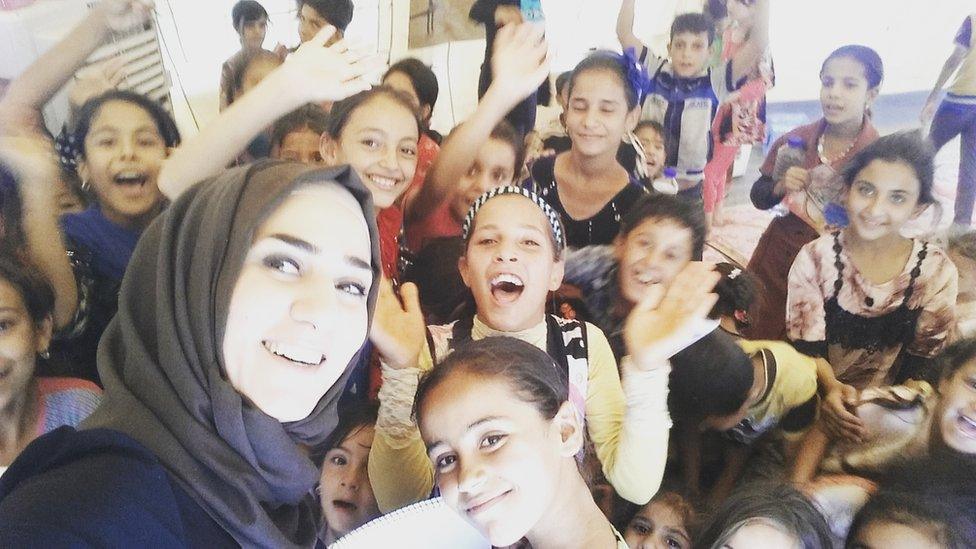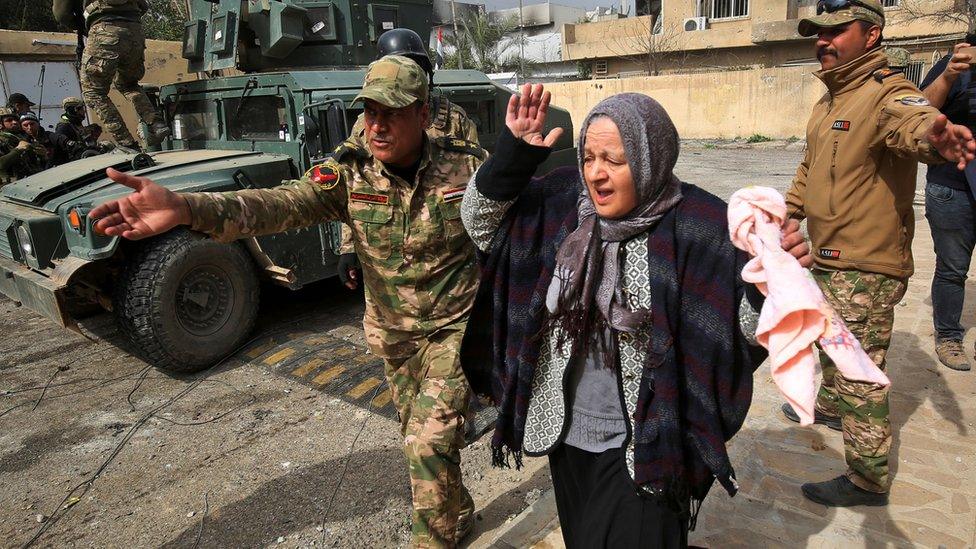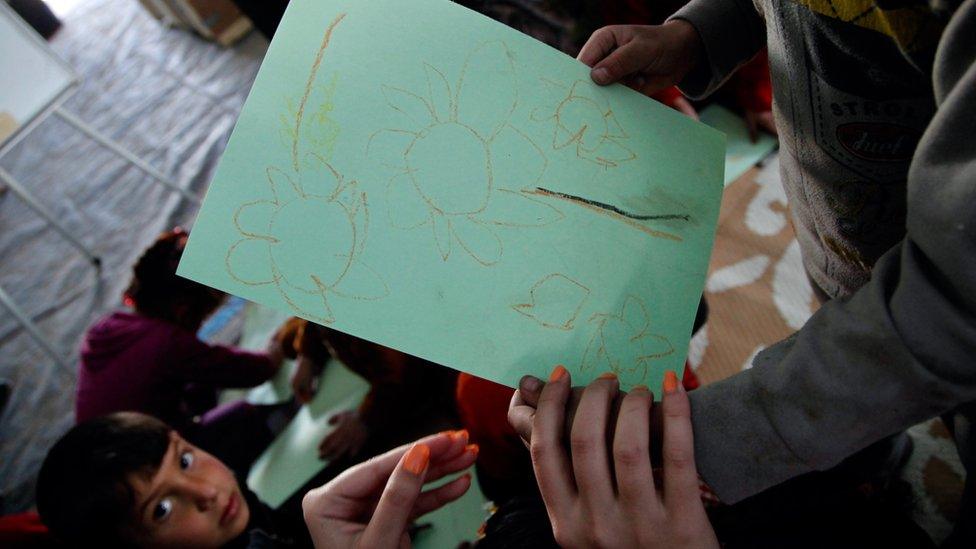The woman using make-up to rebel against Isis
- Published

When is wearing nail polish an act of rebellion?
When you live in Iraqi Kurdistan, where the threat of so-called Islamic State is never far away.
The group has imposed a strict uniform in areas it controls: full body covering for women, only in certain plain colours and styles, and often beards for men.
Vian lives in Erbil, the capital of Iraqi Kurdistan, just 60 miles (85km) from IS territory.
Bur for her, the potential risks of dressing outside of the strict uniform code are worth it.
"To be honest, I feel really strong when I wear new clothes or when I put on make-up," she tells Newsbeat.
"I know it is very unusual in my country, but it makes me happy."
Every day she matches her nails with her headscarf and wears different colours.
But this isn't just about making herself feel good.

As a humanitarian worker for Save the Children, Vian (who did not want to be identified with her full name) works with displaced children, many of whom have spent the last two years living under Islamic State rule in Mosul and other areas.
Many couldn't go to school, or if they did, they were taught using an IS-approved curriculum.
She wants the children to see a world where women can express themselves without fear.
"I want the community or the girls, to be more strong," she says. "I don't want them to face the same thing I have faced in the past."
Life under Islamic State group

An Iraqi woman flees Mosul during an Iraqi forces offensive to retake the area from IS
The city of Mosul, home to an estimated 1.2 to 1.5 million people, fell to IS in June 2014, and the terrorist group has gained control of other areas of Iraq and neighbouring Syria.
Since 2016, local and coalition army forces have started to take back the area - and thousands of people fleeing Islamic State rule have told of daily terror.
Vian's home city Erbil in northern Iraq is around 60 miles (85km) from Mosul, but she works close to Islamic State group strongholds.
She's heard countless stories of curfews and violence, as well as how the group imposed dress codes and restrictions on appearance - for example only black, brown, blue and dark green colours are approved.
"So many times, I have felt scared wearing make-up or when I wear not only coloured scarves, but coloured skirts or trousers," she says.
'You should not show your body'

Vian at work with Save the Children
It isn't always easy. Last year, Vian was in Samarra, Salah Ad Deen - the village where she grew up and where her sister still lives - for a month.
It's close to Mosul and various armed groups, including so-called Islamic State, are still in the area.
As a result, people don't leave their homes after 8pm and many restrict what they wear.
Vian was in Samarra for work, but had a lot of arguments with her sister about what she was wearing.
"One day I spent one or two hours changing three, four, five times, just to wear something that makes my sister happy, to allow me to go to work the next day."
Even though some women have been testing the boundaries and wearing long shirts over trousers, this is still not commonplace - for cultural reasons, as much as fear.
"She [Vian's sister] would say, 'No, you should not show your body,'" Vian says.
'I don't see why it should be different for Iraqi women'
Samarra, around 70 miles (100km) north of Baghdad, is slightly less conservative than it was when Vian and her family grew up there.
But strict rules remain in central and southern Iraq, where most women don't wear make-up and cover their faces, says Vian.
That isn't the case for men. In fact an Iraqi fashion collective Mr Erbil launched onto the international stage last year.
The collective's Twitter feed showcases their style., external
"They [men] always do whatever they want - they are not criticised like us," says Vian.
"They wear what they want to. Even their hairstyles [or] the way they are talking - the space is open usually for men."
Vian points out women have been wearing make-up in Iraq since the time of the Prophet Mohammed, especially eyeliner.
And she's adamant about the importance of opposing conservative rules that dictate what women should and shouldn't wear.
"All women around the world care about themselves and I don't see why it should be different for Iraqi women," she tells Newsbeat.
"I believe all Iraqi women should have the right to do the same."
Find us on Instagram at BBCNewsbeat, external and follow us on Snapchat, search for bbc_newsbeat, external